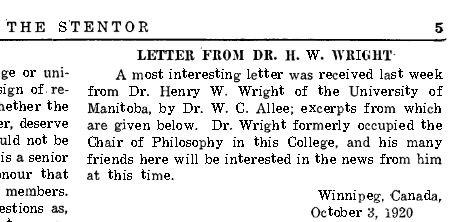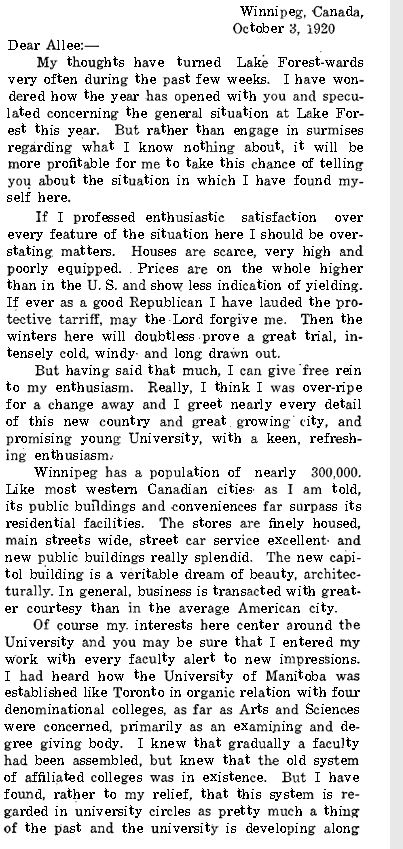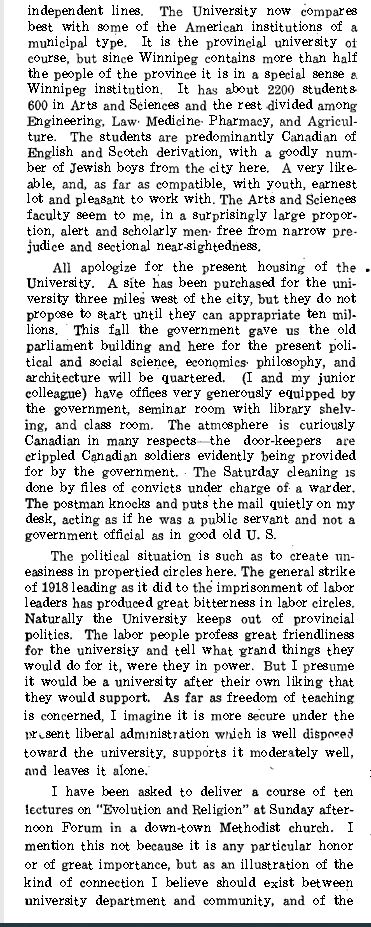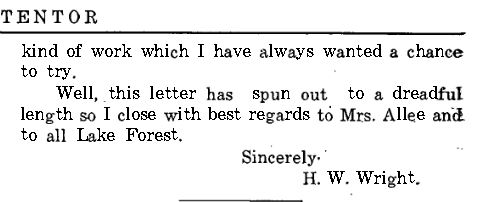In 1920, the following announcement appeared in The Philosophical Review (vol xxix):
Professors Henry W. Wright of Lake Forest University and Rupert C. Lodge of the University of Minnesota have been appointed to professorships in philosophy at the University of Manitoba. (508)
Shortly after his arrival in Winnipeg to begin teaching in the fall of 1920, Wright described his new situation for a former colleague at Lake Forest as follows:
H. W. Wright
University of Manitoba
Winnipeg, Canada
October 3, 1920
Dear Allee, [Warder Clyde Allee]
My thoughts have turned Lake Forest-wards very often during the past few weeks. I have wondered how the year has opened with you and speculated concerning the general situation at Lake Forest this year. But rather than engage in surmises regarding what I know nothing about, it will be more profitable for me to take this chance of telling you about the situation in which I have found myself here.
If I professed enthusiastic satisfaction over every feature of the situation here I should be overstating matters. Houses are scarce, very high [in rent] and poorly equipped. Prices are on the whole higher than in the U. S. and show less indication of yielding. If ever as a good Republican I have lauded the protective tariff, may the Lord forgive me. Then the winters here will doubtless prove a great trial, intensely cold, windy and long drawn out.
But having said that much, I can give free rein to my enthusiasm. Really, I think I was over-ripe for a change away and I greet nearly every detail of this new country and great growing city and promising young University, with a keen, refreshing enthusiasm.
Winnipeg has a population of nearly 300,000. Like most western Canadian cities, as I am told, its public buildings and conveniences far surpass its residential facilities. The stores are finely housed, main streets wide, street car service excellent and new public buildings really splendid. The new capitol building is a veritable dream of beauty, architecturally. In general, business is transacted with greater courtesy than in the average American city.
Of course my interests here center around the promising young University and you may be sure that I entered my work with every faculty alert to new impressions. I had heard how the University of Manitoba was established like Toronto in organic relation with four denominational colleges, as far as Arts and Sciences were concerned, primarily as an examining and degree giving body. I knew that gradually a faculty had been assembled, but knew that the old system of affiliated colleges was in existence. But I have found, rather to my relief, that this system is regarded in university circles as pretty much a thing of the past and the university is developing along independent lines. The University now compares best with some of the American institutions of a municipal type. It is the provincial university, of course, but since Winnipeg contains more than half the people of the province it is in a special sense a Winnipeg institution. It has about 2200 students 600 in Arts and Sciences and the rest divided among Engineering, Law, Medicine, Pharmacy, and Agriculture. The students are predominantly Canadian of English and Scotch derivation, with a goodly number of Jewish boys from the city here. A very likeable lot and pleasant to work with. The Arts and Sciences faculty seem to me, in a surprisingly large proportion, alert and scholarly men free from narrow prejudice and sectional near-sightedness.
All apologize for the present housing of the University. A site has been purchased for the university three miles west of the city, but they do not propose to start until they can appropriate ten millions. This fall the government gave us the old parliament building and here for the present political and social science, economics, philosophy, and architecture will be quartered. I and my junior colleague have offices very generously equipped by the government, seminar room with library shelving, and classroom. The atmosphere is curiously Canadian in many respects — the door-keepers are crippled Canadian soldiers evidently being provided for by the government. The Saturday cleaning is done by files of convicts under charge of a warder. The postman knocks and puts the mail quietly on my desk, acting as if he was a public servant and not a government official as in good old U. S.
The political situation is such as to create uneasiness in propertied circles here. The general strike of 1918 leading as it did to the imprisonment of labor has produced great bitterness in labor circles. Naturally the University keeps out of provincial politics. The labor people profess great friendliness for the university and tell what grand things they would do for it, were they in power. But I presume it would be a university after their own liking that they would support. As far as freedom of teaching is concerned, I imagine it is more secure under the present liberal administration which is well disposed toward the university, supports it moderately well, and leaves it alone.
I have been asked to deliver a course of ten lectures on “Evolution and Religion” at a Sunday afternoon Forum in a downtown Methodist church. I mention this not because it is any particular honor or of great importance, but as an illustration of the kind of connection I believe should exist between university department and community, and of the kind of work which I have always wanted a chance to try.
Well, this letter has spun out to a dreadful length and so I close with best regards to Mrs. Allee and to all Lake Forest.
Sincerely, H. W. Wright
Wright’s letter was published in the weekly Lake Forest College student newspaper, The Stentor, for Oct 22, 1920, p 5:



